Renault Scénic vs Toyota Yaris - Differences and prices compared
Costs and Efficiency:
Price and efficiency are key factors when choosing a car – and this is often where the real differences emerge.
Toyota Yaris has a decisively advantage in terms of price – it starts at 21900 £, while the Renault Scénic costs 34600 £. That’s a price difference of around 12771 £.
Engine and Performance:
Under the bonnet, it becomes clear which model is tuned for sportiness and which one takes the lead when you hit the accelerator.
When it comes to engine power, the Toyota Yaris has a evident edge – offering 280 HP compared to 218 HP. That’s roughly 62 HP more horsepower.
In acceleration from 0 to 100 km/h, the Toyota Yaris is significantly quicker – completing the sprint in 5.50 s, while the Renault Scénic takes 7.90 s. That’s about 2.40 s faster.
In terms of top speed, the Toyota Yaris performs distinct better – reaching 230 km/h, while the Renault Scénic tops out at 170 km/h. The difference is around 60 km/h.
There’s also a difference in torque: Toyota Yaris pulls clearly perceptible stronger with 390 Nm compared to 300 Nm. That’s about 90 Nm difference.
Space and Everyday Use:
Beyond pure performance, interior space and usability matter most in daily life. This is where you see which car is more practical and versatile.
Seats: offers more seating capacity – vs .
In curb weight, Toyota Yaris is clearly lighter – 1090 kg compared to 1822 kg. The difference is around 732 kg.
In terms of boot space, the Renault Scénic offers convincingly more room – 545 L compared to 286 L. That’s a difference of about 259 L.
In maximum load capacity, the Renault Scénic performs clearly better – up to 1670 L, which is about 735 L more than the Toyota Yaris.
When it comes to payload, Toyota Yaris hardly perceptible takes the win – 525 kg compared to 518 kg. That’s a difference of about 7 kg.
Who comes out on top?
Overall, the Toyota Yaris shows itself to be outperforms in nearly all aspects and secures the title of DriveDuel Champion.
It convinces with the more balanced overall package and proves to be the more versatile choice for everyday use.
 @ Toyota Motor Corporation
@ Toyota Motor Corporation
Toyota Yaris
Costs and Consumption
View detailed analysis
Engine and Performance
View detailed analysis
Dimensions and Body
View detailed analysis
Renault Scénic
The Renault Scénic is a quietly clever family MPV that balances everyday practicality with unexpected flair, offering a roomy, flexible cabin that makes school runs and weekend escapes less of a chore. It won't dazzle like a sports car, but its composed ride, sensible tech and thoughtful storage solutions make it a superbly pragmatic choice for buyers who prefer substance with a wink.
details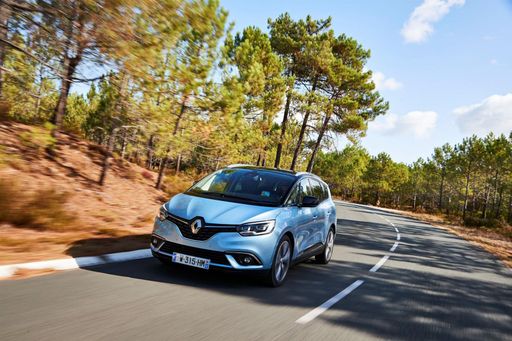 @ Renault Group Media
@ Renault Group Media
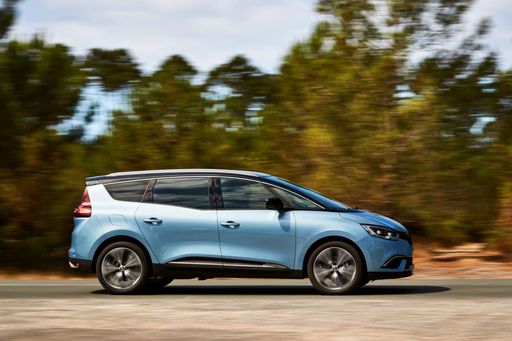 @ Renault Group Media
@ Renault Group Media
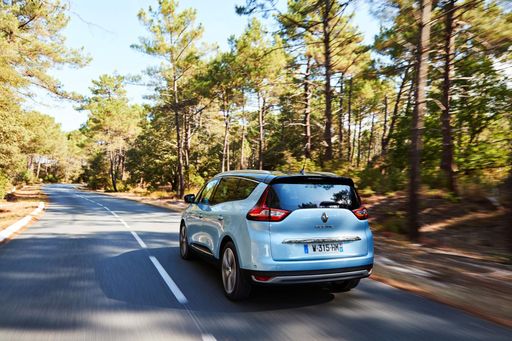 @ Renault Group Media
@ Renault Group Media
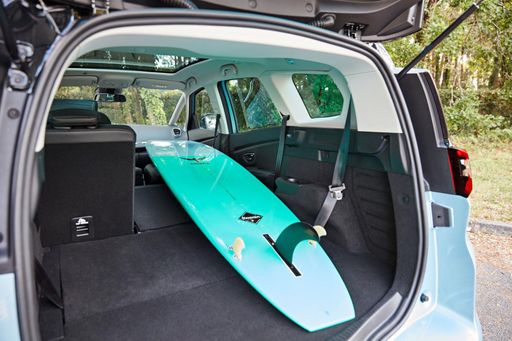 @ Renault Group Media
@ Renault Group Media
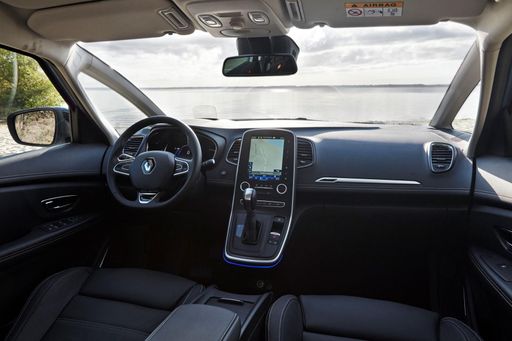 @ Renault Group Media
@ Renault Group Media
Toyota Yaris
The Toyota Yaris is a sprightly city hatch that packs clever packaging, surprising comfort and fuel-sipping manners into a neat, easy-to-park package. It rewards sensible buyers with low running costs, friendly ergonomics and a forgiving drive, delivered with Japanese reliability and just enough personality to make errands feel a little less ordinary.
details @ Toyota Motor Corporation
@ Toyota Motor Corporation
 @ Toyota Motor Corporation
@ Toyota Motor Corporation
 @ Renault Group Media
@ Renault Group Media
|
 @ Toyota Motor Corporation
@ Toyota Motor Corporation
|
|
|
|
Costs and Consumption |
|
|---|---|
|
Price
34600 - 44000 £
|
Price
21900 - 46700 £
|
|
Consumption L/100km
-
|
Consumption L/100km
3.8 - 9.5 L
|
|
Consumption kWh/100km
16.6 - 17.5 kWh
|
Consumption kWh/100km
-
|
|
Electric Range
420 - 598 km
|
Electric Range
-
|
|
Battery Capacity
-
|
Battery Capacity
-
|
|
co2
0 g/km
|
co2
87 - 215 g/km
|
|
Fuel tank capacity
-
|
Fuel tank capacity
36 - 50 L
|
Dimensions and Body |
|
|---|---|
|
Body Type
SUV
|
Body Type
Hatchback
|
|
Seats
5
|
Seats
4 - 5
|
|
Doors
5
|
Doors
3 - 5
|
|
Curb weight
1822 - 1927 kg
|
Curb weight
1090 - 1356 kg
|
|
Trunk capacity
545 L
|
Trunk capacity
141 - 286 L
|
|
Length
4470 mm
|
Length
3940 - 3995 mm
|
|
Width
1864 mm
|
Width
1745 - 1805 mm
|
|
Height
1571 mm
|
Height
1455 - 1500 mm
|
|
Max trunk capacity
1670 L
|
Max trunk capacity
935 L
|
|
Payload
514 - 518 kg
|
Payload
289 - 525 kg
|
Engine and Performance |
|
|---|---|
|
Engine Type
Electric
|
Engine Type
Full Hybrid, Petrol
|
|
Transmission
Automatic
|
Transmission
Automatic, Manuel
|
|
Transmission Detail
Reduction Gearbox
|
Transmission Detail
CVT, Manual Gearbox, Automatic Gearbox
|
|
Drive Type
Front-Wheel Drive
|
Drive Type
Front-Wheel Drive, All-Wheel Drive
|
|
Power HP
170 - 218 HP
|
Power HP
116 - 280 HP
|
|
Acceleration 0-100km/h
7.9 - 8.6 s
|
Acceleration 0-100km/h
5.5 - 9.7 s
|
|
Max Speed
150 - 170 km/h
|
Max Speed
175 - 230 km/h
|
|
Torque
280 - 300 Nm
|
Torque
390 Nm
|
|
Number of Cylinders
-
|
Number of Cylinders
3
|
|
Power kW
125 - 160 kW
|
Power kW
85 - 206 kW
|
|
Engine capacity
-
|
Engine capacity
1490 - 1618 cm3
|
General |
|
|---|---|
|
Model Year
2025
|
Model Year
2024 - 2025
|
|
CO2 Efficiency Class
A
|
CO2 Efficiency Class
B, G
|
|
Brand
Renault
|
Brand
Toyota
|
What drive types are available for the Renault Scénic?
Available configurations include Front-Wheel Drive.
The prices and data displayed are estimates based on German list prices and may vary by country. This information is not legally binding.
